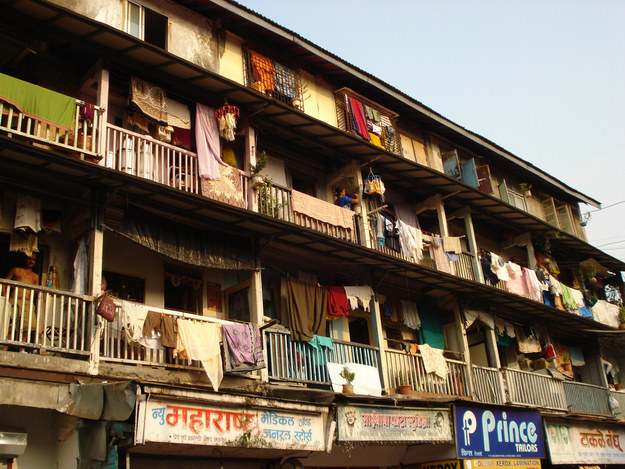Telling of the fable of Mumbai is not complete without
experiencing Mumbai’s chawls. A chawl is basically a 3-5 storied building with
10-20 rooms on each floor better known as kholis.
Basically it’s as many rooms as the landlord can build as he gets rent per
room. A kholi is a multi-purpose room serving for sleeping, storage, kitchen,
and dining. Average rents run to about ₹1,000/month. Much like engineering
college hostels, each floor of kholis share a common block of bathrooms. Kholis
with private bathrooms are considered premium
kholis and may cost about ₹1,500/month for rent. The common bathrooms are
always filled with filth and at no time could you go there without queue, drunkards,
and lechers hanging around them. And these are shared by both men and women.
Each kholi is cramped up with 8-15 people on any given day. Many a times,
individual kholis are divided into a front room and back room, with the front
room rented out to another family.
I had been in Mumbai once before and in my limited
experience during internships I’d seen from afar the chawls of Andheri (E) and
Kurla. One thing I noticed was that they were all Muslims, leading me to
believe that a majority of Muslim population in Mumbai is poor and lives in
chawls; this came from the knowledge that an average Indian Muslim has a lower
income and more mouths to feed than an average Hindu.
Such misconceptions broke as I lived longer in Mumbai. I
realized something very deep and profound. Poverty had no religion. It affected
everyone equally. There were chawls with concentrated pockets of Hindus,
Muslims, Christians, etc. But there were chawls of all kinds. Poverty wasn’t
correlated with a religion. It was correlated with the lack of money. Yet when
I walked through these close-quartered chawls with little privacy, I saw how
close communities could get when left uncared for. I saw chawls with Hindus,
Musmils, Christians, Jains, and a Parsi family living in the same building
having no disputes whatsoever, in an extremely harmonious and healthy manner. I
saw Hindus working in tanneries and mosques built near temples. In my own
“urban” dwelling in Calcutta, I could not imagine this.
Mumbai chawls reminded me of my own hostel from IIT KGP.
Though to be honest, our rooms in the hostels were much smaller and had lesser
amenities. The thing which striked me the most were the balconies which
encouraged people to come out and interact with each other. Much like my Hall
(not hostel) at Kharagpur, these ensured that people would come out, mingle,
and create avenues in pursuit of common interests.
Dharavi, the world’s largest slum resides in the heart of
the city. A few basic facts about this swirling vortex of entropy.
Dharavi
|
Mumbai
|
India
|
Dharavi (% of Mumbai)
|
|
Population
|
700k
|
19M
|
1.25
Bn
|
3.7%
|
Area
|
2
km2
|
1,300
km2
|
3.3M
km2
|
0.2%
|
Economy
|
$500
M
|
$209
Bn
|
$1.9
Tn
|
0.2%
|
Population Density
|
350,000
people/km2
|
14,615
people/km2
|
382
people/km2
|
|
GDP per capita
|
$714
|
$11,000
|
$1,520
|
|
Land utilization
|
$250M/km2
|
$161M/km2
|
$576k/km2
|
|
Hindus
|
60%
|
67%
|
80%
|
3%
|
Muslims
|
33%
|
19%
|
14%
|
6%
|
Christians
|
6%
|
4%
|
2%
|
6%
|
90% of such chawls are illegally constructed. In lack of
public utilities, the residents in these chawls face serious sanitary issues. The water is often filled with roaches,
centipedes, earthworms, and even the occasional scorpion which make their way
inside houses. Clean water is available for 1-2 hrs/day which is filled in iron
drums for everyday for the purposes of washing, cooking, and drinking. Even
then it isn’t uncommon to find human and animal excrement mixed in the water,
which people have gotten used to drinking anyway.
Something else you notice about these chawls is the struggle
of survival. Resources and human life are so precious in these chawls that
virtually any other form of life is wiped out – grass, flowers, plants, animals
– nothing. The only animals that were left were wary and aggressive towards
humans, knowing well the cruelty human beings are capable of inflicting.
I saw that generally, all the doors of the kholis were kept
open at all times during the day. This was because the place could get very
suffocating if kept closed. People from all walks of life live in the chawls,
such as lawyers, accountants, gamblers, drug-peddlers, prostitutes, etc. There
were clear marks of which blocks to go near and which not to, which was
identified by which kholis the playing children avoided. Much like the hostels,
people participated in social gatherings together and there was always someone
in the neighborhood who’d let you know so you could come along.
Rampant disease and lack of hygiene are nothing uncommon in
these chawls. Drunkards, mental disorders, rodents, violence, skin diseases,
are generally accepted as a part and parcel of life.
Coming back, I did not feel pity. I did not know what I
felt. On one hand, I was disgusted with the pathetic living conditions these
people faced. On the other, I was inspired by the life these people found in
whatever little they had. Today I take clean running water and dry walls as a
part of life which I don’t even give a second thought to. To think that these
might mean luxury for someone is hard to imagine. These chawls show the heights
of both human kindness and cruelty. It’s tough to imagine and between those
dazzling lights and fast cars there belongs another world, stricken with
poverty and neglect. And whatever I do, they will continue to exist.



